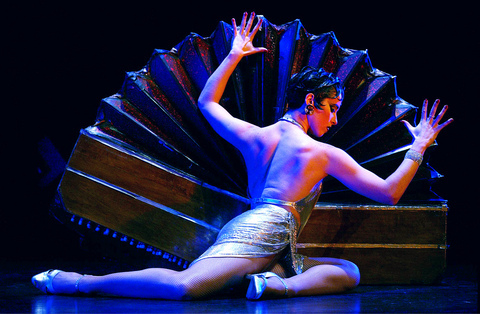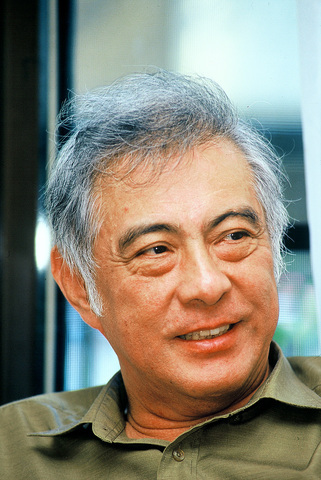Hsu Po-yun (許博允), who was born in 1944 in Japan, is one of the most fascinating figures in Taiwan's artistic
community.
Through extensive travels and experience, Hsu is well-informed and organizes events by world-class stars and troupes in Taiwan.

PHOTOS COURTESY OF NEW ASPECT FOUNDATION
His goal is to improve the quality of cultural life in Taiwan and to enlighten his compatriots.
In 1978, Hsu and his wife Fan Man-nong (
And in the almost three decades since its inception the New Aspect has put on over 6,000 events with some 20,000 artists from 88 countries having performed for more than 7 million audience members at 130 different venues in 88 cities/counties throughout Taiwan.

PHOTO COURTESY OF JIN CHENG-CAI
New Aspect has held over 100 world premier performances and countless Taiwan premiers in music.
Such impressive achievements may have made Hsu and his wife famous, but have not necessarily brought them great riches.
Hsu's enthusiasm in promoting artistic activities in Taiwan proved disastrous in 1997 when he sponsored a concert at the Chiang Kai-shek memorial hall by Luciano Pavarotti, Placido Domingo and Diana Ross.
The event called "Super Concert" was held outside and attracted an audience of some 60,000.
However, more than two thirds of the audience watched from afar and hadn't bought tickets for the concert.
The poor choice of venue for the concert almost bankrupted Hsu and he was forced to sell several of his houses to pay back bank loans, which at one time totalled NT$200 million.
Later on, he would tell his media friends and college students who attended his lectures that, "promoting the arts in Taiwan offers the least potential to make big bucks."
Despite the setback Hsu has gone on to prove his abilities.
Hsu believes that artists themselves should promote culture so that people who understand art can lead the artistic community in a proper manner, the New Idea
Hsu hails from a prominent local family. He said his childhood home was a mansion filled with many antiques.
His grandfather Hsu Ping
After graduating from high school in 1960, he learned to play the violin and studied music theory under Professor Hsu Tsang-houei
Hsu consequently took on the multiple roles of music performer, composer, impresario and cultural reformer.
On Dec. 9, he will hold a concert at the National Concert Hall to present many of his music masterpieces.
Hsu composed his first musical composition aged 19 in 1962 and his most popular work The Pipa (琵琶隨筆),written in 1975, has been performed more than 300 times in several dozens of cities throughout 30 or more countries.
His music has been well received in Japan, Korea, Hong Kong, Singapore and Malaysia.
Artists and news media in Europe have also presented Hsu's music in many different forms, including stage-shows, music performances, radio shows and movies.
Hsu is critical of the National Chiang Kai-shek Center for
extending the musical The Phantom of the Opera to a run of almost three months starting from Jan. 18.
"The long duration of a performance for one single troupe would ruthlessly take away the opportunity for a great number of local or other international artists to perform there."
Moreover, he maintains that since the center is publicly funded, it should not profit from any program it offers and should reduce ticket prices.
Hsu points out that the Really Useful Company, which is sending its cast to perform in Taiwan, is owned by an Australian who registered his company in London.
There are at least four different troupes performing The Phantom in the world and the Really Useful Company's cast is certainly not the best.
However, the center has been accused of overcharging the public by charging the highest ticket price for the musical in Asia.
The causes, Hsu said, could be that either the organizer is
charging too much, or the center is paying too high a price to the Australian company.
According to local media reports, the center paid NT$300 million for a total of 63 shows of The Phantom which puts the production cost for each show at between NT$8 to 9 million, much higher than the NT$6 million the show cost to put on in New York.
Hsu suggested that the center should, in the future, avoid
sponsoring any commercial program such as The Phantom and should only allow each group to perform for two weeks, with a possible one week extension.
Otherwise, the more than one thousand local performance groups that are desperate to stage their shows would suffer serious financial losses, and would not be able to find venues at which to perform to make enough money to survive.
In the 1980s, Hsu organized a series of performances called "New Environment of Asian Music" with his musician friends in Japan, Korea, the Philippines, Thailand and Hong Kong and was invited to deliver speeches in many countries including the US, France and Poland.
After undergoing heart surgery earlier this year he decided to hold his much delayed concert. Many of his friends including Ju Tzong-ching

The primaries for this year’s nine-in-one local elections in November began early in this election cycle, starting last autumn. The local press has been full of tales of intrigue, betrayal, infighting and drama going back to the summer of 2024. This is not widely covered in the English-language press, and the nine-in-one elections are not well understood. The nine-in-one elections refer to the nine levels of local governments that go to the ballot, from the neighborhood and village borough chief level on up to the city mayor and county commissioner level. The main focus is on the 22 special municipality

The People’s Republic of China (PRC) invaded Vietnam in 1979, following a year of increasingly tense relations between the two states. Beijing viewed Vietnam’s close relations with Soviet Russia as a threat. One of the pretexts it used was the alleged mistreatment of the ethnic Chinese in Vietnam. Tension between the ethnic Chinese and governments in Vietnam had been ongoing for decades. The French used to play off the Vietnamese against the Chinese as a divide-and-rule strategy. The Saigon government in 1956 compelled all Vietnam-born Chinese to adopt Vietnamese citizenship. It also banned them from 11 trades they had previously

Hsu Pu-liao (許不了) never lived to see the premiere of his most successful film, The Clown and the Swan (小丑與天鵝, 1985). The movie, which starred Hsu, the “Taiwanese Charlie Chaplin,” outgrossed Jackie Chan’s Heart of Dragon (龍的心), earning NT$9.2 million at the local box office. Forty years after its premiere, the film has become the Taiwan Film and Audiovisual Institute’s (TFAI) 100th restoration. “It is the only one of Hsu’s films whose original negative survived,” says director Kevin Chu (朱延平), one of Taiwan’s most commercially successful

Jan. 12 to Jan. 18 At the start of an Indigenous heritage tour of Beitou District (北投) in Taipei, I was handed a sheet of paper titled Ritual Song for the Various Peoples of Tamsui (淡水各社祭祀歌). The lyrics were in Chinese with no literal meaning, accompanied by romanized pronunciation that sounded closer to Hoklo (commonly known as Taiwanese) than any Indigenous language. The translation explained that the song offered food and drink to one’s ancestors and wished for a bountiful harvest and deer hunting season. The program moved through sites related to the Ketagalan, a collective term for the